Table of Contents
Meditation is a practice that humans have been engaging in for millennia. In fact, archaeologists have found evidence of meditation in the Indus Valley dating back to 5,000-3,500 B.C.
While this practice has an ancient past, it’s only been recently that it’s gained mainstream attention in the west. There are many purported benefits of meditation, including some promising research about its ability to help with addiction recovery.
If you’re interested in starting to meditate, though, it can be hard to know where to begin. Luckily, there are lots of meditation apps on the market that you can use to help guide your practice. However, there’s also a lot of variation in the features of these apps and how much they cost.
Let’s take a look at some of the best meditation and recovery apps to help you build your best life.
What Is Meditation?
Meditation is a practice that encourages focused attention and a heightened state of awareness. This is also a technique that can change your state of consciousness. Cultures have been practicing meditation for thousands of years all over the world.
There are a number of different types of meditation, including mindfulness meditation, transcendental meditation, movement meditation, and guided meditation.
What Are the Benefits of Meditation for Addiction Recovery?
Researchers have increasingly been discovering the benefits of meditation for addiction recovery. A growing body of studies have found that meditation can help you manage triggers for unwanted impulses and develop mental awareness. Let’s take a look at some of the other benefits of meditation and how they relate to addiction recovery.
Improves Mental Well-Being
Studies have found that meditation promotes emotional health and reduces anxiety. Helping to promote a positive outlook and improve your self-image, meditation can help give you the best possible foundation from which to start a new sober life.
Reduces Stress
One of the most commonly discussed benefits of meditation is its ability to reduce stress significantly. This is incredibly important when it comes to addiction recovery, as individuals often have to find new ways to cope with stressors in sobriety.
No matter where you are on your recovery journey, it’s important to have go-to ways to deal with stress when it arises. There has also been some studies that show that meditation can help people learn to recover from stress more easily and become less reactive to stress.
Meditation is just one of the healthy alternatives to drug use. Check out this article to learn about other activities for a healthy, sober life.
Boosts Physical Health
Believe it or not, meditation can also help improve your physical health in addition to your mental health. It can help to reduce the strain on your heart by decreasing your blood pressure. Over time, this can help to reduce strain on your arteries and heart as well as helping prevent the occurrence of heart disease.
Helps You Manage Pain
Some people struggle with addiction because they are self-medicating for pain. Meditation is a natural way that has been found to reduce pain. On top of that, studies have shown that meditation can reduce symptoms of depression in people with chronic pain and improve their quality of life.
Improves Sleep
For people who struggle with addiction, there’s often a relationship between their substance of choice and their sleep cycle. Perhaps you’ve used drugs or alcohol in order to wind down at night or to get going in the morning. Either way, meditation can help you find a healthier, more natural rhythm when it comes to sleep.
Offers Spiritual Connection
Another benefit of meditation is that it can also help you connect with your spiritual side. Some people find that spirituality is an essential ingredient in the recovery process.
Helps Build Mental Discipline
Building a meditation routine can also help you build mental discipline. Through increasing your awareness of triggers and your self-control, meditation might help you break dependencies.
Studies have found that meditation might help individuals manage their emotions and impulses and redirect their attention.
Enhances Self-Awareness
One of the struggles that people in recovery deal with is feeling like they don’t have control over their actions. No matter how hard they try, they feel that they relapse without even really realizing it.
Meditation can help to increase your self-awareness. This means it can help you grow into your best self and help you understand yourself better. This can help you recognize how your feeling more quickly in a way that could prevent relapse.
What Are the Best Meditation Apps for Recovery?
It’s entirely possible to meditate without the use of technology. In fact, it’s one of the lowest maintenance activities out there. However, sometimes some guidance can be helpful when trying a new thing and building a routine.
Here are some of the best meditation apps that could help you during your addiction recovery.
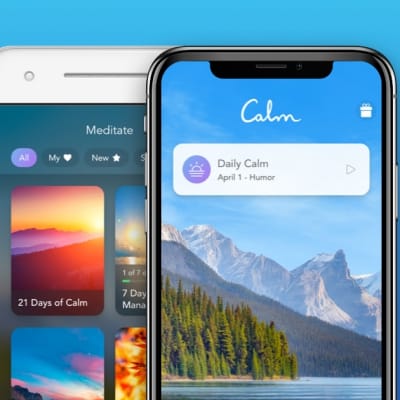
Calm
Calm is one of the most popular meditation apps out there. Designed to help people build a daily meditation routine and manage anxiety, there are loads of guided meditations offered on the app.
This app is less structured than some of the others on our list and offers more individual exercises. However, it does require a subscription and isn’t as intuitive as some other apps.
The cost of membership is about $70 for a year. However, you can sign up for a seven-day free trial to see if it fits your needs before paying.
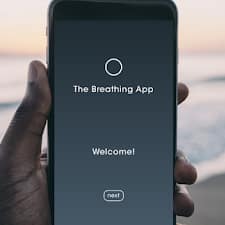
The Breathing App
This app was created by Dr. Deepak Chopra and the world-renowned yogi Eddie Stern. Featuring meditation music created by Moby, the Breathing App focuses on teaching resonance breathing. This exercise is thought to help rest your nervous system and calm you down.
One of the great things about this app is that it’s totally free.
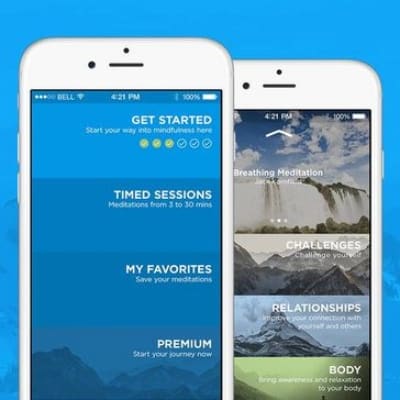
The Mindfulness App
The Mindfulness App is a free meditation platform that is well suited for people who have practiced meditation before. You can create custom sessions with time periods from three to thirty minutes in length. You also can choose the sounds that best fit your meditation style.
While the app is free, you can pay for a premium subscription in order to unlock some more features including full courses. If you choose to buy the premium version, it runs about $60 per year.
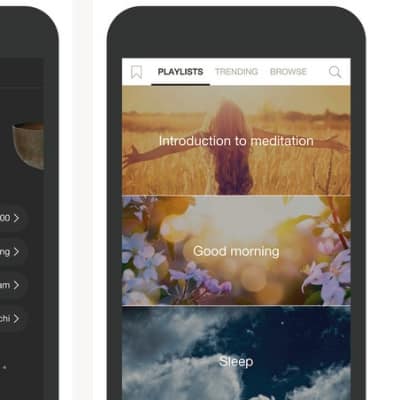
Insight Timer
Insight Timer has an enormous library of free meditations that are easily searchable. While you can choose to buy a premium membership for $60 a year, there are more than 45,000 meditations that are free of charge.
There’s also a free seven-day intro course included, helping you begin a meditation routine.
This is one of the best apps because of its free resources as well as its free community of meditators. However, sometimes the vast library can actually overwhelm users. The app is also more prone to technical glitches than some of the other apps on the list.
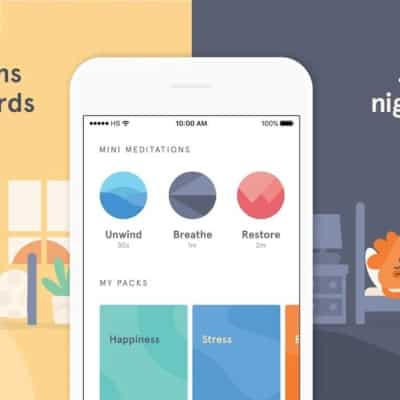
Headspace
Headspace has a very user-friendly interface and is suitable for everyone from beginners to experts. There are hundreds of meditations you can choose from on this app. They provide sleep meditations, breathing exercises, and wind-down practices.
Another great thing about this app is that your screen automatically dims when you’re using it. That means that you’re less susceptible to the stress and headache of your screen’s bright light.
However, it does require a subscription which is about $70 a year. To find out if Headspace is worth the price, they offer a free two-week trial.
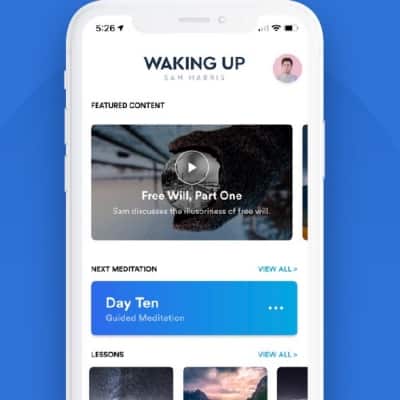
Waking Up
Waking Up is ideal for people who are looking to make a permanent change in their meditation routine. This app was developed by Sam Harris, a bestselling author, neuroscientist, and philosopher. You’ll find that Waking Up offers more intent and structure rather than passive meditation.
Access to this app costs $99 per year or $139 for a family plan. There is a seven-day free trial to help you learn whether or not this is the right app for you.
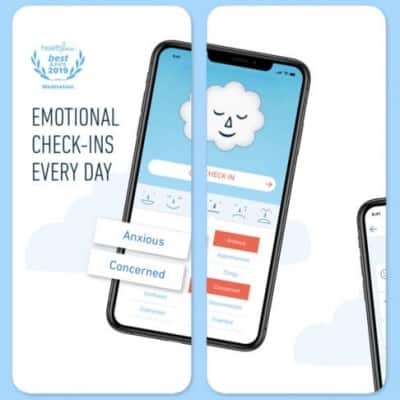
My Life
My Life is a bit different than the other meditation apps on our list. The idea here is that mindfulness is a more all-encompassing activity that doesn’t just include meditation. Other methods of mindfulness can be tracked using this app, such as yoga and breathwork.
While some of the features are free, there is also a premium version. If you decide to go premium, you can choose between a $59 annual fee or a $10 monthly fee.
What Are Some Other Apps for Addiction Support?
The above apps are specifically focused on meditation. Here are a number of highly reviewed apps that are more geared towards addiction recovery.
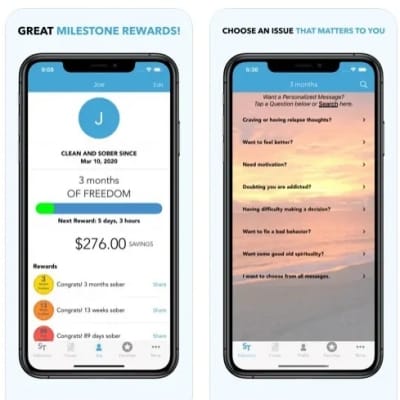
SoberTool
The SoberTool app offers an easy way to track your sober days. To help you stay on track, you receive motivational messages as well as rewards every time you hit a milestone.
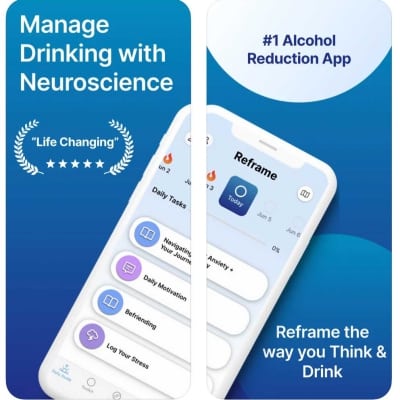
Reframe
Reframe is a bit different than the other apps on our list. The focus here isn’t on recovery but rather alcohol reduction. The goal is to help you reduce the amount of alcohol you consume while also improving your fitness, nutrition, and wellness.
This tool can be useful for alcohol reduction, but it might not be the right thing for people with serious addictions. If you’re in need of outside support, you can learn more about our four pillars of sobriety here.
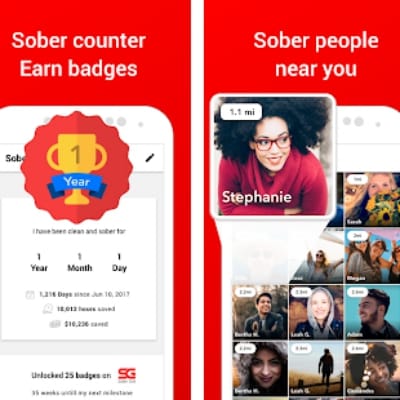
Sober Grid
Sober Grid is kind of like a social media network for people who are in recovery. This lets you communicate with other people that are going through similar struggles as you are. When you create an online profile, you can then find other people in your area who are also using the app.
This can be particularly helpful if you live in a place where you feel you don’t have much of a support network. Similarly, it can be a great way to build community when you travel.
Strides App
Strides App isn’t specifically designed for people in addiction recovery, but it’s very applicable to that journey. This app can help you track and organize any of the habits that you want to build into your routine. This is an application that can help you set goals, stay motivated, and focus.
One great thing about this app is that it’s free for you to track your three most important goals. If you want to have access to premium features and unlimited goals and habits, you can sign up for the Plus plan. For this plan, it costs $4.99 a month or $29.99 a year.
Are you wondering if going to rehab is right for you? Check out the benefits of rehab here.
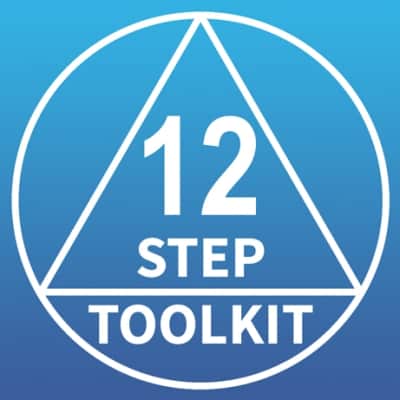
12 Step Toolkit
The 12 Step Toolkit is an app that is based around the 12 step philosophy. This app features a recovery calculator, the big Book, recovery stories, and more.
This app is free for now, but only for a limited time. However, if you download it now, you can use it for free for the rest of your life.

Thought for the Day
Thought for the Day is a simple app put out by the Hazelden Betty Ford Foundation. This app offers daily meditations specifically for people who are affected by addiction or who are in recovery. Each day, you can read a thought for the day, a meditation for the day, and a prayer for the day.
Is It Time for You to Begin Your Recovery?
As you can see, there are countless options when it comes to meditation apps. There are additionally a number of great recovery apps available to help you keep track of your progress.
Is it time for you to begin your journey to recovering a healthy life? If so, we’re here to help.
At our San Diego rehab center, we focus on both treatment and education to help you on your path to sobriety. If you’re ready to get your life back, contact us today.

Medically Reviewed By:
Dr. Sanjai Thankachen
Dr. Sanjai Thankachen graduated from Adichunchanagiri Institute of Medicine in 2000. He completed his residency in psychiatry in 2008 at Creedmoor Psychiatric Center in New York. Dr. Thankachen is currently working with Pacific Neuropsychiatric Specialists in an outpatient practice, as well as working at multiple in-patient psychiatric and medical units bringing his patients the most advanced healthcare treatment in psychiatry. Dr. Thankachen sees patients with an array of disorders, including depression, bipolar illness, schizophrenia, anxiety, and dementia-related problems.

Edited for Clinical Accuracy By:
Sean Leonard, Psychiatric Nurse Practitioner
Sean Leonard is a board-certified psychiatric nurse practitioner. He received his master’s degree in adult geriatric primary care nurse practitioner from Walden University and a second postmaster specialty in psychiatry mental health nurse practitioner from Rocky Mountain University. Sean has experience working in various diverse settings, including an outpatient clinic, inpatient detox and rehab, psychiatric emergency, and dual diagnosis programs. His specialty areas include substance abuse, depression, anxiety, mood disorders, PTSD, ADHD, and OCD.
Sources
- 1. Hecht, M. (2020, September 04). Meditation for pain relief: What to know & how to try it (D. Weatherspoon Ph.D., R.N., CRNA, Ed.). Retrieved January 14, 2022, from https://www.healthline.com/health/meditation-for-chronic-pain
- 2. National Center for Complementary and Integrative Health. (n.d.). Meditation: In depth. Retrieved January 14, 2022, from https://www.nccih.nih.gov/health/meditation-in-depth
- 3. NIDA. 2020, March 9. Connections between Sleep and Substance Use Disorders. Retrieved from https://www.drugabuse.gov/about-nida/noras-blog/2020/03/connections-between-sleep-substance-use-disorders on 2022, January 13
- 4. Puff, R., Ph.D. (2013, July 7). An overview of meditation: Its origins and traditions … (E. Hagan, Ed.). Retrieved January 14, 2022, from https://www.psychologytoday.com/us/blog/meditation-modern-life/201307/overview-meditation-its-origins-and-traditions
- 5. Suttie, J. (2018, October 24). Five ways mindfulness meditation is good for your health. Retrieved January 14, 2022, from https://greatergood.berkeley.edu/article/item/five_ways_mindfulness_meditation_is_good_for_your_health
